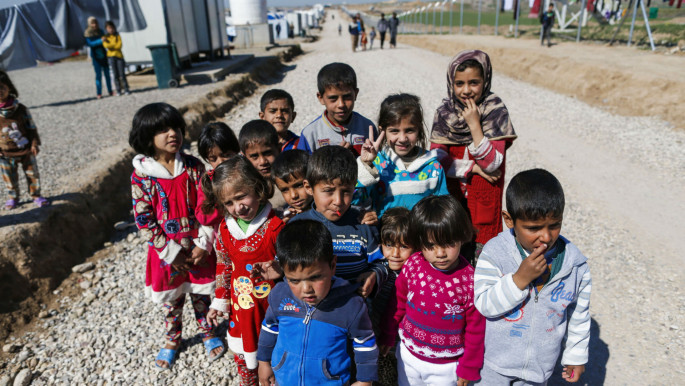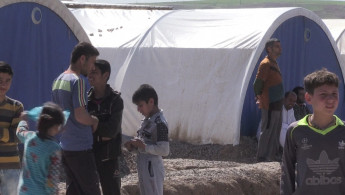Mosul's children process trauma through play
The lucky ones have since arrived in local refugee camps, run by UN aid agencies – and the more lucky still are being treated in 'Child Friendly Spaces', run by the United Nation's children's fund, UNICEF.
"Here is where children feel like children again," said Maulid Warfa, a local official with UNICEF at the Hasan Sham camp, 20 miles east of Mosul.
"They have seen things that they should not have, many of them have seen people that have been killed. They have seen dead bodies."
More than 200,000 people have fled west Mosul since the Iraqi-led coalition offensive started in October, according to the Iraqi authorities – around half of whom are children.
Many of the children's faces in this friendly space betray the obvious effects of a recent hunger and hardship which has robbed them of innocence.
 |
|
| Click to expand: Some of the children who attend the Children Friendly Space [source: AFP] |
"It's because of Daesh [IS] that we are here," says nine-year-old Abd al-Rahman, sitting next to Nora at the black table strewn with crayon sketches.
"There," he says, referring to Mosul, "there is fear."
In the background, the sound of children playing fills the gaps between his words.
In this safe space, children are allowed to play and heal themselves from the trauma they've experienced. The areas also create a space to return to healthy routines where they can experience some semblance of a normal life again.
The tent's facilities are basic and few – limited to a few plastic tables and chairs, paper and drawing materials. The inside and outside of the tents are covered with bright, colourful murals, drawn by the children themselves to make it look more attractive.
 |
They have seen things that they should not have, many of them have seen people that have been killed. They have seen dead bodies |  |
A recent evaluation of Child Friendly Spaces found the programme created a "small but robust impact" on "improving psychosocial well-being" – especially in younger children.
The study's authors suggested this was related to "poorer attendance for older children" and "greater challenges" in keeping them engaged.
Here in this safe space, children can channel their inner demons into art-work and hopefully learn to deal with their experiences through psychological first aid.
"Some are aggressive and they run away from adults. There are those who hit their friends, others who don't want to share anything," said one social worker, who refused to be named.
"Even though they look normal... they are burning inside," added Warfa.(With input from AFP)





 Follow the Middle East's top stories in English at The New Arab on Google News
Follow the Middle East's top stories in English at The New Arab on Google News


